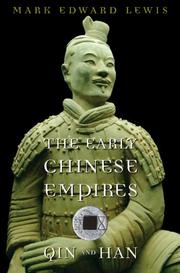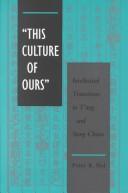| Listing 1 - 10 of 88 | << page >> |
Sort by
|
Book
ISBN: 3110719258 3110717816 Year: 2021 Publisher: München ; Wien : De Gruyter Oldenbourg,
Abstract | Keywords | Export | Availability | Bookmark
 Loading...
Loading...Choose an application
- Reference Manager
- EndNote
- RefWorks (Direct export to RefWorks)
Seit dem Tode Mao Zedongs im Jahr 1976 kämpft die Kommunistische Partei Chinas um einen innerparteilichen und gesellschaftlichen Konsens zum Umgang mit ihren eigenen "historischen Fehlern". Immer wieder werden offizielle Narrative sowohl durch zivilgesellschaftliche Akteure als auch aus dem Inneren der Partei heraus in Frage gestellt bzw. kritisiert. Anhand der Entwicklung unterschiedlicher offizieller und inoffizieller Narrative zur Kampagne gegen Rechtsabweichler (1957-1958) lässt sich erkennen, dass der Kampf um das kollektive Gedächtnis, insbesondere im China unter Xi Jinping, eine langanhaltende zentrale politische Herausforderung für die nachhaltige Stabilisierung der Herrschaftslegitimation der KPCh darstellt.
Multi
ISBN: 9780822393573 9781283252072 9781478091486 1478091487 Year: 2011 Publisher: Durham, NC : Duke University Press,
Abstract | Keywords | Export | Availability | Bookmark
 Loading...
Loading...Choose an application
- Reference Manager
- EndNote
- RefWorks (Direct export to RefWorks)
Chinese merchants have traded with Southeast Asia for centuries, sojourning and sometimes settling, during their voyages. These ventures have taken place by land and by sea, over mountains and across deserts, linking China with vast stretches of Southeast Asia in a broad, mercantile embrace. Chinese Circulations provides an unprecedented overview of this trade, its scope, diversity, and complexity. This collection of twenty groundbreaking essays foregrounds the commodities that have linked China and Southeast Asia over the centuries, including fish, jade, metal, textiles, cotton, rice, opium, timber, books, and edible birds' nests. Human labor, the Bible, and the coins used in regional trade are among the more unexpected commodities considered. In addition to focusing on a certain time period or geographic area, each of the essays explores a particular commodity or class of commodities, following its trajectory from production, through exchange and distribution, to consumption. The first four pieces put Chinese mercantile trade with Southeast Asia in broad historical perspective; the other essays appear in chronologically ordered sections covering the precolonial period to the present. Incorporating research conducted in Chinese, Japanese, Vietnamese, Thai, Burmese, Malay, Indonesian, and several Western languages, Chinese Circulations is a major contribution not only to Sino-Southeast Asian studies but also to the analysis of globalization past and present. Contributors. Leonard Blussé, Wen-Chin Chang, Lucille Chia, Bien Chiang, Nola Cooke, Jean DeBernardi, C. Patterson Giersch, Takeshi Hamashita, Kwee Hui Kian, Li Tana, Lin Man-houng, Masuda Erika, Adam McKeown, Anthony Reid , Sun Laichen, Heather Sutherland, Eric Tagliacozzo, Carl A. Trocki, Wang Gungwu, Kevin Woods, Wu Xiao

ISBN: 0674040147 9780674040144 9780674024779 067402477X 9780674057340 0674057341 0674265424 Year: 2007 Publisher: Cambridge, Mass.
Abstract | Keywords | Export | Availability | Bookmark
 Loading...
Loading...Choose an application
- Reference Manager
- EndNote
- RefWorks (Direct export to RefWorks)
In 221 B.C. the First Emperor of Qin unified what would become the heart of a Chinese empire whose major features would endure for two millennia. In the first of a six-volume series on the history of imperial China, Lewis highlights the key challenges facing the court officials and scholars who set about governing an empire of such scale and diversity.
China --- History. --- HISTORY / Asia / China.
Book
ISBN: 0674040155 9780674040151 9780674060357 0674060350 9780674026056 0674026055 0674265408 9780674265400 Year: 2009 Publisher: Cambridge, Mass. : Belknap Press of Harvard University Press,
Abstract | Keywords | Export | Availability | Bookmark
 Loading...
Loading...Choose an application
- Reference Manager
- EndNote
- RefWorks (Direct export to RefWorks)
After the collapse of the Han dynasty in the third century CE, China divided along a north-south line. This book traces the changes that both underlay and resulted from this split in a period that saw the geographic redefinition of China, more engagement with the outside world, significant changes to family life, developments in the literary and social arenas, and the introduction of new religions.
China --- History --- HISTORY / Asia / China.
Book
ISBN: 0674725220 0674033655 9780674033658 9780674047020 0674047028 Year: 2007 Publisher: Cambridge, Mass. : Harvard University Press,
Abstract | Keywords | Export | Availability | Bookmark
 Loading...
Loading...Choose an application
- Reference Manager
- EndNote
- RefWorks (Direct export to RefWorks)
This illuminating work examines the social, cultural, political, and economic dimensions of the Communist takeover of China. Instead of dwelling on elite politics and policy-making processes, Dilemmas of Victory seeks to understand how the 1949-1953 period was experienced by various groups, including industrialists, filmmakers, ethnic minorities, educators, rural midwives, philanthropists, stand-up comics, and scientists. A stellar group of authors that includes Frederic Wakeman, Elizabeth Perry, Sherman Cochran, Perry Link, Joseph Esherick, and Chen Jian shows that the Communists sometimes achieved a remarkably smooth takeover, yet at other times appeared shockingly incompetent. Shanghai and Beijing experienced it in ways that differed dramatically from Xinjiang, Tibet, and Dalian. Out of necessity, the new regime often showed restraint and flexibility, courting the influential and educated. Furthermore, many policies of the old Nationalist regime were quietly embraced by the new Communist rulers. Based on previously unseen archival documents as well as oral histories, these lively, readable essays provide the fullest picture to date of the early years of the People's Republic, which were far more pluralistic, diverse, and hopeful than the Maoist decades that followed.
HISTORY / Asia / China. --- China --- History
Book
ISBN: 3110396564 3110355329 9783110355321 9783110355307 3110355302 9783110396560 Year: 2017 Publisher: Berlin, [Germany] ; Boston, [Massachusetts] : De Gruyter Oldenbourg,
Abstract | Keywords | Export | Availability | Bookmark
 Loading...
Loading...Choose an application
- Reference Manager
- EndNote
- RefWorks (Direct export to RefWorks)
China has undergone tremendous social, economic, and political transformations since 1949, developing into a modern society with unprecedented speed. This textbook surveys the history of the country, introducing the reader to academic debates on domestic and foreign policy and on the development of China’s society, economy, and culture. It includes an extensive bibliography. In einzigartiger Weise bewegt sich die Geschichte der Volksrepublik China in einem Spannungsfeld zwischen Kommunismus, Kapitalismus und Tradition. Dabei hat das Land einen rasanten Aufstieg vom kommunistischen Entwicklungsland zur einer der größten globalen Wirtschaftsmächte durchlaufen. Das Lehrbuch bietet einen anschaulichen, leicht verständlichen Überblick über die wechselhafte Geschichte Chinas von 1949 bis zur Gegenwart, führt in die Forschungsdebatten zur Innen- und Außenpolitik sowie zur Entwicklung von Gesellschaft, Wirtschaft und Kultur ein und enthält eine ausführliche Bibliographie.
HISTORY / Asia / China. --- China --- History
Multi
ISBN: 9783110560718 9783110558296 3110558297 3110560712 Year: 2018 Publisher: Berlin : De Gruyter Oldenbourg,
Abstract | Keywords | Export | Availability | Bookmark
 Loading...
Loading...Choose an application
- Reference Manager
- EndNote
- RefWorks (Direct export to RefWorks)
The year 1919 changed Chinese culture radically, but in a way that completely took contemporaries by surprise. At the beginning of the year, even well-informed intellectuals did not anticipate that, for instance, baihua (aprecursor of the modern Chinese language), communism, Hu Shi and Chen Duxiu would become important and famous - all of which was very obvious to them at the end of the year. Elisabeth Forster traces the precise mechanisms behind this transformation on the basis of a rich variety of sources, including newspapers, personal letters, student essays, advertisements, textbooks and diaries. She proposes a new model for cultural change, which puts intellectual marketing at its core. This book retells the story of the New Culture Movement in light of the diversifi ed and decentered picture of Republican China developed in recent scholarship. It is a lively and ironic narrative about cultural change through academic infi ghting, rumors and conspiracy theories, newspaper stories and intellectuals (hell-)bent on selling agendas through powerful buzzwords.
History / Asia / China --- History --- China

ISBN: 0804765758 9780804765756 0804719209 9780804719209 0804723613 Year: 2020 Publisher: Stanford, CA : Stanford University Press,
Abstract | Keywords | Export | Availability | Bookmark
 Loading...
Loading...Choose an application
- Reference Manager
- EndNote
- RefWorks (Direct export to RefWorks)
This book traces the shared culture of the Chinese elite from the seventh to the twelfth centuries. The early T'ang definition of 'This Culture of Ours' combined literary and scholarly traditions from the previous five centuries. The late Sung Neo-Confucian movement challenged that definition. The author argues that the Tang-Sung transition is best understood as a transition from a literary view of culture - in which literary accomplishment and mastery of traditional forms were regarded as essential - to the ethical orientation of Neo-Confucianism, in which the cultivation of one's innate moral ability was regarded as the goal of learning. The author shows that this transformation paralleled the collapse of the T'ang order and the restoration of a centralized empire under the Sung, underscoring the connection between elite formation and political institutions.
Book
ISBN: 9781400878840 1400878845 9780691627014 0691627010 9780691030555 0691030553 0691653151 9780691653150 Year: 1955 Publisher: Princeton, New Jersey : Princeton University Press,
Abstract | Keywords | Export | Availability | Bookmark
 Loading...
Loading...Choose an application
- Reference Manager
- EndNote
- RefWorks (Direct export to RefWorks)
A study of the growth of semi-personal Chinese armies and the rise of militarists to a position that permitted them to seize power upon the breakdown of the monarchic system. It traces the modernization of the land forces of the Chinese Empire and evaluates progress attained up to the establishment of the Republic in 1912. Ralph Powell is on leave from the history department at Princeton University as a professor at the National War College.Originally published in 1955.The Princeton Legacy Library uses the latest print-on-demand technology to again make available previously out-of-print books from the distinguished backlist of Princeton University Press. These editions preserve the original texts of these important books while presenting them in durable paperback and hardcover editions. The goal of the Princeton Legacy Library is to vastly increase access to the rich scholarly heritage found in the thousands of books published by Princeton University Press since its founding in 1905.
Book
ISBN: 9780520401822 Year: 2024 Publisher: Berkeley : University of California Press,
Abstract | Keywords | Export | Availability | Bookmark
 Loading...
Loading...Choose an application
- Reference Manager
- EndNote
- RefWorks (Direct export to RefWorks)
A free ebook version of this title is available through Luminos, University of California Press's Open Access publishing program. Visit www.luminosoa.org to learn more. In the late fifth century, a girl whose name has been forgotten by history was born at the edge of the Chinese empire. By the time of her death, she had transformed herself into Empress Dowager Ling, one of the most powerful politicians of her age and one of the first of many Buddhist women to wield incredible influence in dynastic East Asia. In this book, Stephanie Balkwill documents the Empress Dowager's rise to power and life on the throne against the broader world of imperial China under the rule of the Northern Wei dynasty, a foreign people from Inner Asia who built their capital deep in the Chinese heartland. Building on largely untapped Buddhist materials, Balkwill shows that the life and rule of the Empress Dowager is a larger story of the reinvention of religious, ethnic, and gender norms in a rapidly changing multicultural society. The Women Who Ruled China recovers the voices of those left out of the mainstream historical record, painting a compelling portrait of medieval Chinese society reinventing itself under the Empress Dowager's leadership.
Buddhism --- Multiculturalism --- HISTORY / Asia / China. --- History
| Listing 1 - 10 of 88 | << page >> |
Sort by
|

 Search
Search Feedback
Feedback About UniCat
About UniCat  Help
Help News
News